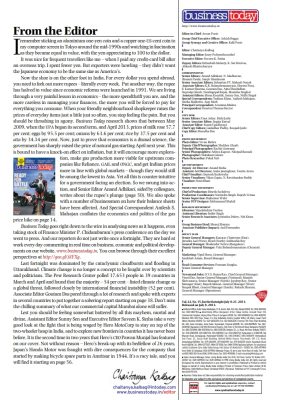Ready For Battle
[Business Today]
Published date: 21st Jul 2013
I remember sticking an aluminium one-yen coin and a copper one-US-cent coin to my computer screen in Tokyo around the mid-1990s and watching in fascination Las they became equal in value, with the yen appreciating to 100 to the dollar.
It was nice for frequent travellers like me when I paid my credit-card bill after an overseas trip, I spent fewer yen. But exporters were howling – they didn’t want the Japanese economy to be the same size as America’s.
Now the shoe is on the other foot in India. For every dollar you spend abroad, you need to fork out more rupees- literally every week. Put another way, the rupee has halved in value since economic reforms were launched in 1991. We are living through a very painful lesson in economics-the more spendthrift you are, and the more careless in managing your finances, the more you will be forced to pay for everything you consume. When your friendly neighbourhood shopkeeper raises the prices of everyday items just a little just so often, you stop feeling the pain. But you should be thrashing in agony. Business Today research shows that between May 2009, when the UPA began its second term, and April 2013. prices of milk rose 57.7 per cent; eggs by 95.5 per cent: onions by 63.6 per cent; rice by 37.5 per cent and atta by 34.14 per cent. Now, just to prove that economics is a dismal science, the government has sharply raised the price of natural gas starting April next year. This is bound to have a knock-on effect on inflation, but it will encourage more exploration, make gas production more viable for upstream companies like Reliance, GAIL and ONGC, and get Indian prices more in line with global markets though they would still be among the lowest in Asia. Yet all this is counter-intuitive for a government facing an election. So we swung into action, and Senior Editor Anand Adhikari, aided by colleagues. writes about the rupee’s plunge (page 50). We also spoke with a number of businessmen on how their balance sheets have been affected. And Special Correspondent Anilesh S. Mahajan conflates the economics and politics of the gas price hike on page 14.
Business Today goes right down to the wire in analysing news as it happens, even taking stock of Finance Minister P. Chidambaram’s press conference on the day we went to press. And our reporters do not just write once a fortnight. They are hard at work every day commenting in real time on business, economic and political developments on our website, www.businesstoday.in, You can browse through their excellent perspectives at http://goo.gl/j8FXg.
Last fortnight was dominated by the cataclysmic cloudbursts and flooding in Uttarakhand. Climate change is no longer a concept to be fought over by scientists and politicians. The Pew Research Center polled 37,653 people in 39 countries in March and April and found that the majority-54 per cent-listed climate change as a global threat, followed closely by international financial instability (52 per cent). Associate Editor Goutam Das pored through a lot of research and spoke with experts in several countries to put together a sobering report starting on page 38. Don’t miss the chilling summary of what our commercial capital Mumbai alone will suffer.
Lest you should be feeling somewhat battered by all this mayhem, mortal and divine, Assistant Editor Sunny Sen and Executive Editor Suveen K. Sinha take a very good look at the fight that is being waged by Hero MotoCorp to stay on top of the two-wheeler heap in India, and to explore new frontiers in countries it has never been before. It is the second time in two years that Hero’s CEO Pawan Munjal has featured on our cover. Not without reason-Hero’s break-up with its bedfellow of 26 years, Japan’s Honda Motor was fraught with dire consequences for the company that started by making bicycle spare parts in Amritsar in 1944. It’s a racy tale, and you will find it starting on page 56.






